Nursing Leadership: Reflective Journal on Humility & Leadership Style
VerifiedAdded on 2023/06/10
|5
|1174
|308
Journal and Reflective Writing
AI Summary
This reflective journal delves into the critical aspect of humility in nursing leadership, drawing upon practicum experiences and observations from weeks 13-14. The author reflects on interactions with a nurse leader who demonstrated humility, emphasizing the importance of acknowledging responsibility towards others and fostering an empathetic relationship with employees. The journal critically evaluates personal experiences, highlighting an instance where the nurse leader's humble guidance facilitated learning and motivation. Utilizing servant leadership principles, the author outlines a plan to improve their own leadership style by incorporating humility, encouraging open communication, and valuing employee feedback. The reflection underscores the significance of humility in building effective leadership and fostering a supportive work environment.
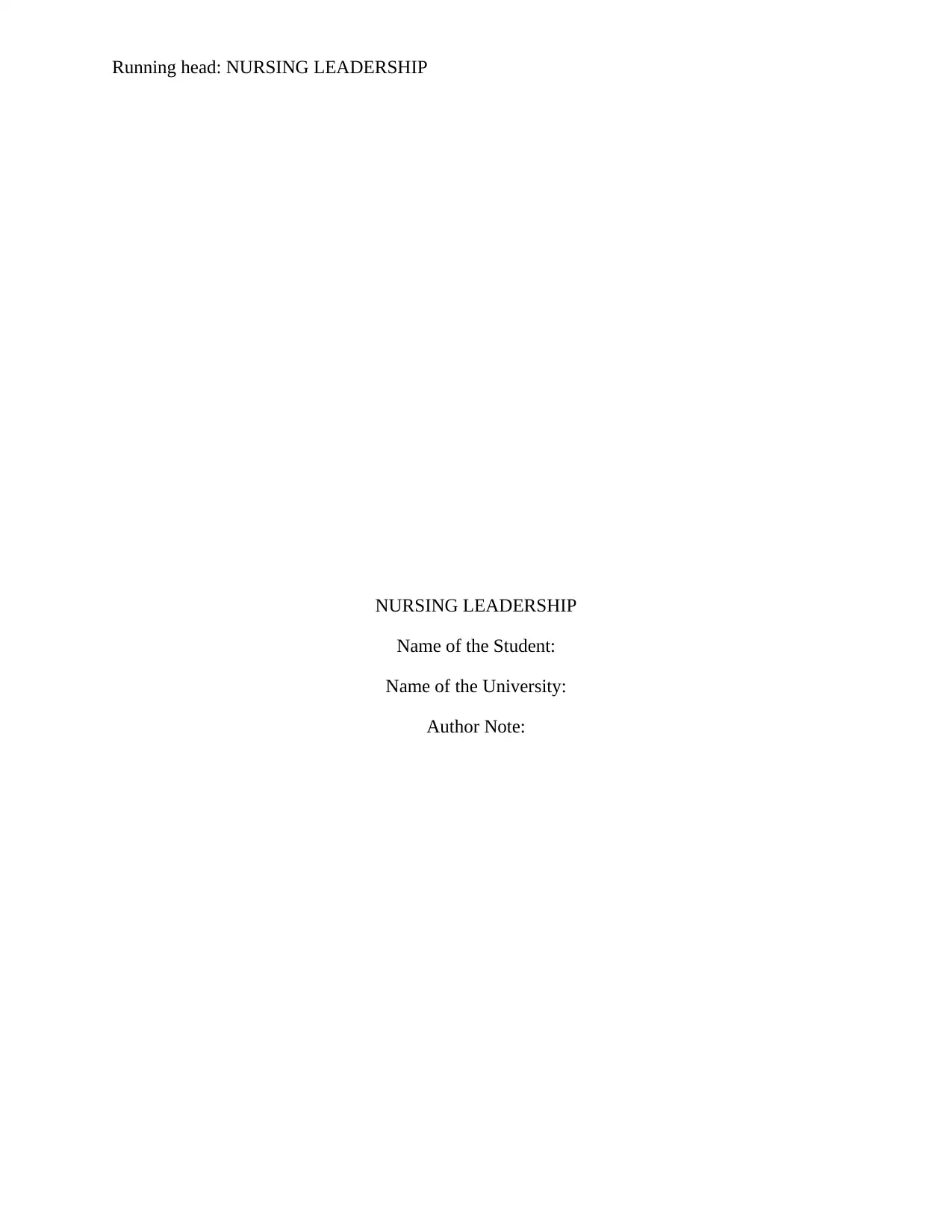
Running head: NURSING LEADERSHIP
NURSING LEADERSHIP
Name of the Student:
Name of the University:
Author Note:
NURSING LEADERSHIP
Name of the Student:
Name of the University:
Author Note:
Paraphrase This Document
Need a fresh take? Get an instant paraphrase of this document with our AI Paraphraser
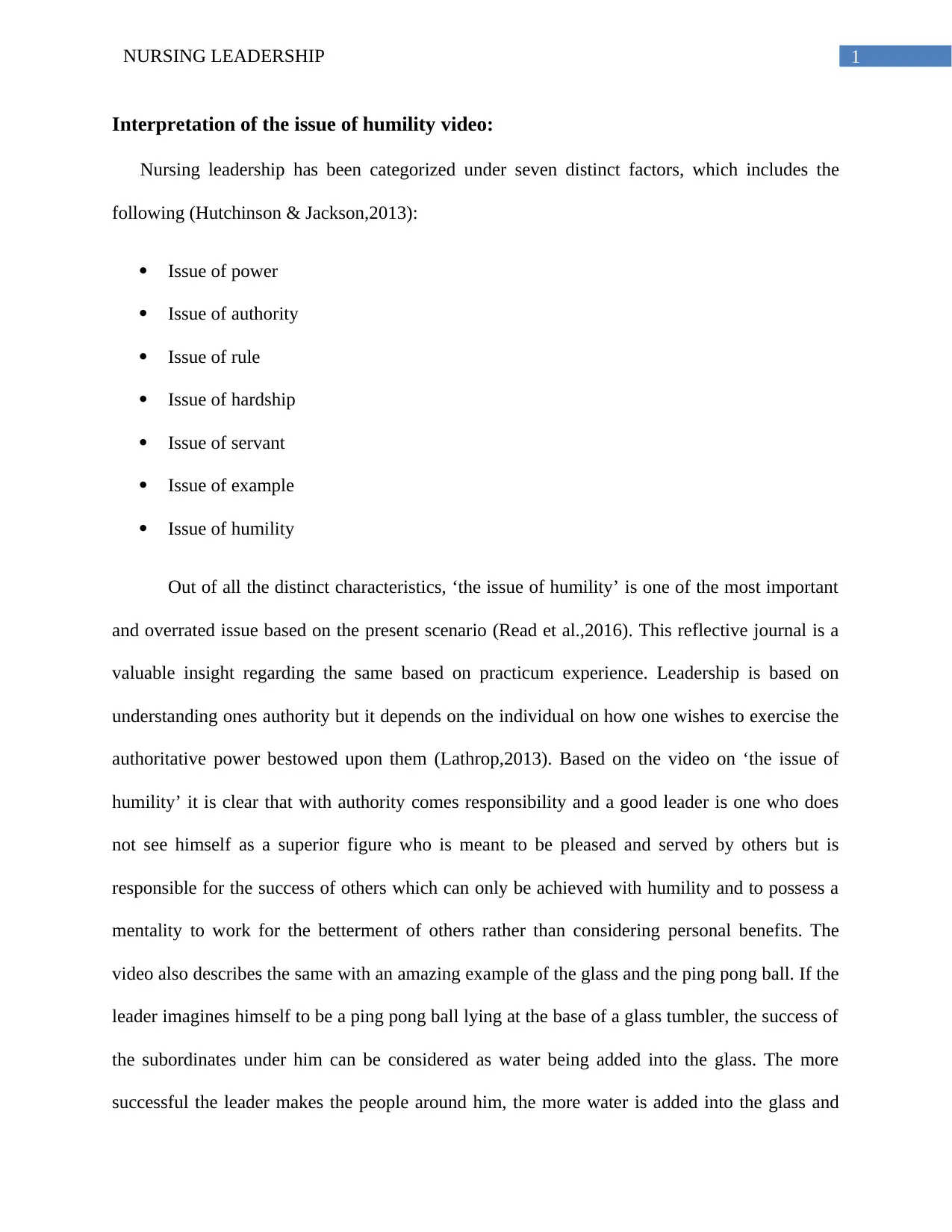
1NURSING LEADERSHIP
Interpretation of the issue of humility video:
Nursing leadership has been categorized under seven distinct factors, which includes the
following (Hutchinson & Jackson,2013):
Issue of power
Issue of authority
Issue of rule
Issue of hardship
Issue of servant
Issue of example
Issue of humility
Out of all the distinct characteristics, ‘the issue of humility’ is one of the most important
and overrated issue based on the present scenario (Read et al.,2016). This reflective journal is a
valuable insight regarding the same based on practicum experience. Leadership is based on
understanding ones authority but it depends on the individual on how one wishes to exercise the
authoritative power bestowed upon them (Lathrop,2013). Based on the video on ‘the issue of
humility’ it is clear that with authority comes responsibility and a good leader is one who does
not see himself as a superior figure who is meant to be pleased and served by others but is
responsible for the success of others which can only be achieved with humility and to possess a
mentality to work for the betterment of others rather than considering personal benefits. The
video also describes the same with an amazing example of the glass and the ping pong ball. If the
leader imagines himself to be a ping pong ball lying at the base of a glass tumbler, the success of
the subordinates under him can be considered as water being added into the glass. The more
successful the leader makes the people around him, the more water is added into the glass and
Interpretation of the issue of humility video:
Nursing leadership has been categorized under seven distinct factors, which includes the
following (Hutchinson & Jackson,2013):
Issue of power
Issue of authority
Issue of rule
Issue of hardship
Issue of servant
Issue of example
Issue of humility
Out of all the distinct characteristics, ‘the issue of humility’ is one of the most important
and overrated issue based on the present scenario (Read et al.,2016). This reflective journal is a
valuable insight regarding the same based on practicum experience. Leadership is based on
understanding ones authority but it depends on the individual on how one wishes to exercise the
authoritative power bestowed upon them (Lathrop,2013). Based on the video on ‘the issue of
humility’ it is clear that with authority comes responsibility and a good leader is one who does
not see himself as a superior figure who is meant to be pleased and served by others but is
responsible for the success of others which can only be achieved with humility and to possess a
mentality to work for the betterment of others rather than considering personal benefits. The
video also describes the same with an amazing example of the glass and the ping pong ball. If the
leader imagines himself to be a ping pong ball lying at the base of a glass tumbler, the success of
the subordinates under him can be considered as water being added into the glass. The more
successful the leader makes the people around him, the more water is added into the glass and
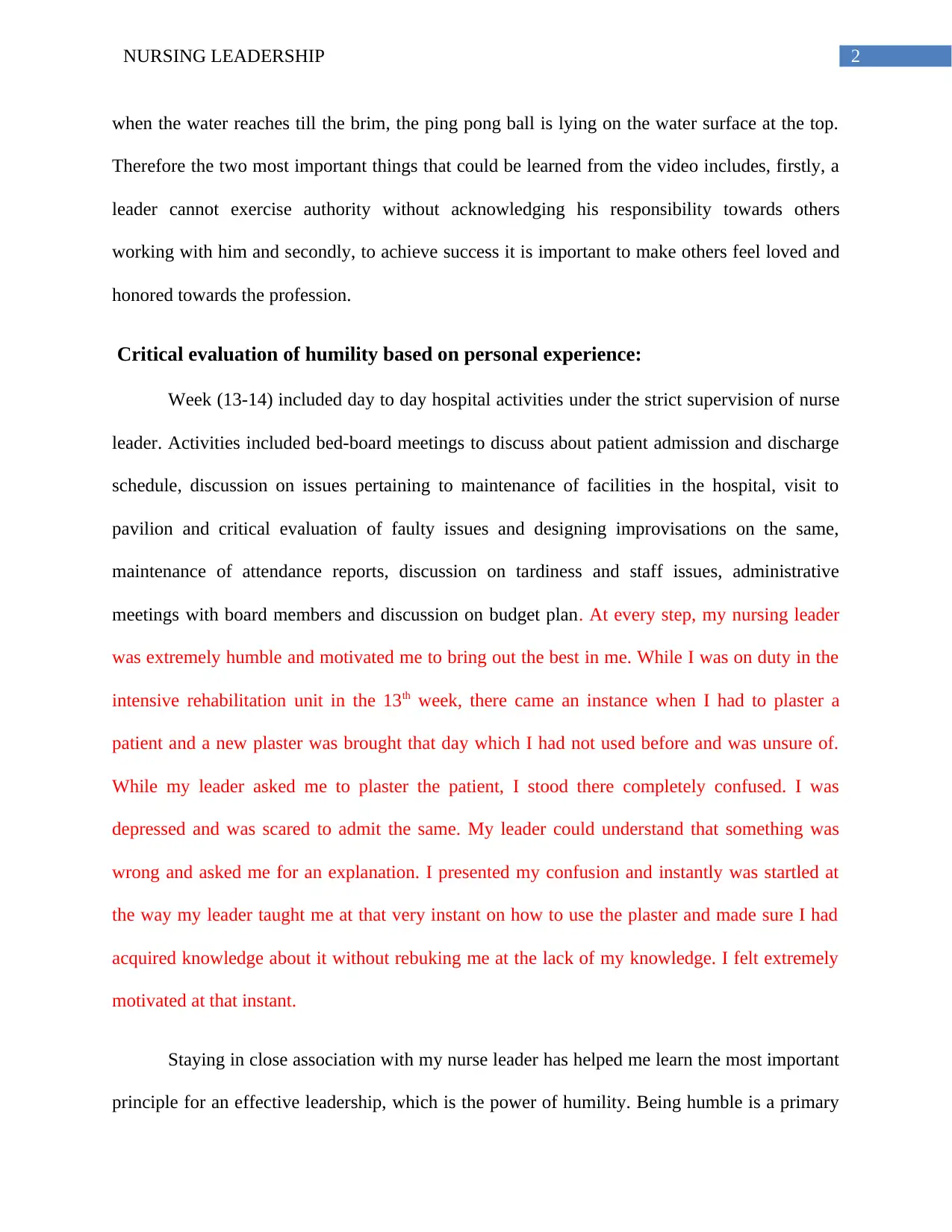
2NURSING LEADERSHIP
when the water reaches till the brim, the ping pong ball is lying on the water surface at the top.
Therefore the two most important things that could be learned from the video includes, firstly, a
leader cannot exercise authority without acknowledging his responsibility towards others
working with him and secondly, to achieve success it is important to make others feel loved and
honored towards the profession.
Critical evaluation of humility based on personal experience:
Week (13-14) included day to day hospital activities under the strict supervision of nurse
leader. Activities included bed-board meetings to discuss about patient admission and discharge
schedule, discussion on issues pertaining to maintenance of facilities in the hospital, visit to
pavilion and critical evaluation of faulty issues and designing improvisations on the same,
maintenance of attendance reports, discussion on tardiness and staff issues, administrative
meetings with board members and discussion on budget plan. At every step, my nursing leader
was extremely humble and motivated me to bring out the best in me. While I was on duty in the
intensive rehabilitation unit in the 13th week, there came an instance when I had to plaster a
patient and a new plaster was brought that day which I had not used before and was unsure of.
While my leader asked me to plaster the patient, I stood there completely confused. I was
depressed and was scared to admit the same. My leader could understand that something was
wrong and asked me for an explanation. I presented my confusion and instantly was startled at
the way my leader taught me at that very instant on how to use the plaster and made sure I had
acquired knowledge about it without rebuking me at the lack of my knowledge. I felt extremely
motivated at that instant.
Staying in close association with my nurse leader has helped me learn the most important
principle for an effective leadership, which is the power of humility. Being humble is a primary
when the water reaches till the brim, the ping pong ball is lying on the water surface at the top.
Therefore the two most important things that could be learned from the video includes, firstly, a
leader cannot exercise authority without acknowledging his responsibility towards others
working with him and secondly, to achieve success it is important to make others feel loved and
honored towards the profession.
Critical evaluation of humility based on personal experience:
Week (13-14) included day to day hospital activities under the strict supervision of nurse
leader. Activities included bed-board meetings to discuss about patient admission and discharge
schedule, discussion on issues pertaining to maintenance of facilities in the hospital, visit to
pavilion and critical evaluation of faulty issues and designing improvisations on the same,
maintenance of attendance reports, discussion on tardiness and staff issues, administrative
meetings with board members and discussion on budget plan. At every step, my nursing leader
was extremely humble and motivated me to bring out the best in me. While I was on duty in the
intensive rehabilitation unit in the 13th week, there came an instance when I had to plaster a
patient and a new plaster was brought that day which I had not used before and was unsure of.
While my leader asked me to plaster the patient, I stood there completely confused. I was
depressed and was scared to admit the same. My leader could understand that something was
wrong and asked me for an explanation. I presented my confusion and instantly was startled at
the way my leader taught me at that very instant on how to use the plaster and made sure I had
acquired knowledge about it without rebuking me at the lack of my knowledge. I felt extremely
motivated at that instant.
Staying in close association with my nurse leader has helped me learn the most important
principle for an effective leadership, which is the power of humility. Being humble is a primary
⊘ This is a preview!⊘
Do you want full access?
Subscribe today to unlock all pages.

Trusted by 1+ million students worldwide
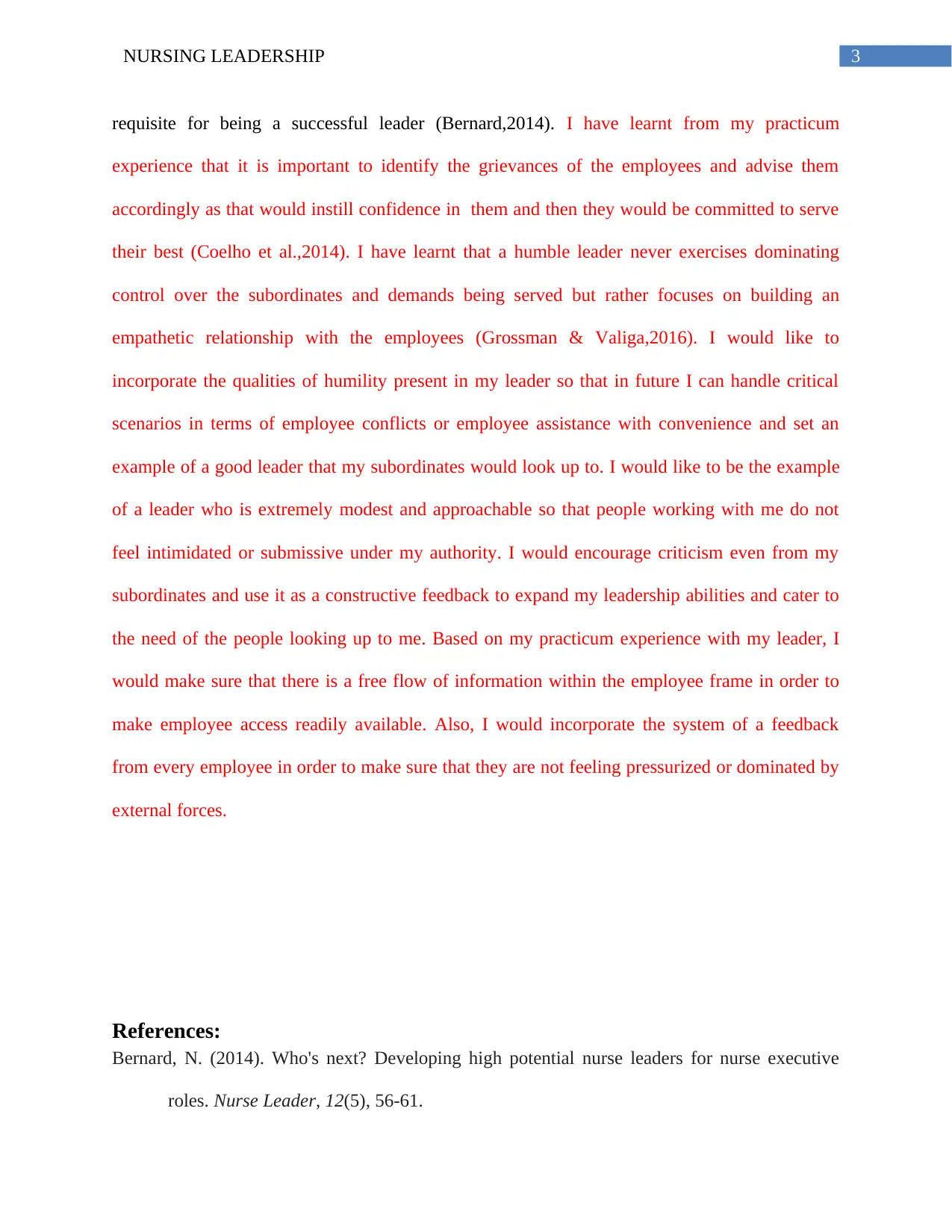
3NURSING LEADERSHIP
requisite for being a successful leader (Bernard,2014). I have learnt from my practicum
experience that it is important to identify the grievances of the employees and advise them
accordingly as that would instill confidence in them and then they would be committed to serve
their best (Coelho et al.,2014). I have learnt that a humble leader never exercises dominating
control over the subordinates and demands being served but rather focuses on building an
empathetic relationship with the employees (Grossman & Valiga,2016). I would like to
incorporate the qualities of humility present in my leader so that in future I can handle critical
scenarios in terms of employee conflicts or employee assistance with convenience and set an
example of a good leader that my subordinates would look up to. I would like to be the example
of a leader who is extremely modest and approachable so that people working with me do not
feel intimidated or submissive under my authority. I would encourage criticism even from my
subordinates and use it as a constructive feedback to expand my leadership abilities and cater to
the need of the people looking up to me. Based on my practicum experience with my leader, I
would make sure that there is a free flow of information within the employee frame in order to
make employee access readily available. Also, I would incorporate the system of a feedback
from every employee in order to make sure that they are not feeling pressurized or dominated by
external forces.
References:
Bernard, N. (2014). Who's next? Developing high potential nurse leaders for nurse executive
roles. Nurse Leader, 12(5), 56-61.
requisite for being a successful leader (Bernard,2014). I have learnt from my practicum
experience that it is important to identify the grievances of the employees and advise them
accordingly as that would instill confidence in them and then they would be committed to serve
their best (Coelho et al.,2014). I have learnt that a humble leader never exercises dominating
control over the subordinates and demands being served but rather focuses on building an
empathetic relationship with the employees (Grossman & Valiga,2016). I would like to
incorporate the qualities of humility present in my leader so that in future I can handle critical
scenarios in terms of employee conflicts or employee assistance with convenience and set an
example of a good leader that my subordinates would look up to. I would like to be the example
of a leader who is extremely modest and approachable so that people working with me do not
feel intimidated or submissive under my authority. I would encourage criticism even from my
subordinates and use it as a constructive feedback to expand my leadership abilities and cater to
the need of the people looking up to me. Based on my practicum experience with my leader, I
would make sure that there is a free flow of information within the employee frame in order to
make employee access readily available. Also, I would incorporate the system of a feedback
from every employee in order to make sure that they are not feeling pressurized or dominated by
external forces.
References:
Bernard, N. (2014). Who's next? Developing high potential nurse leaders for nurse executive
roles. Nurse Leader, 12(5), 56-61.
Paraphrase This Document
Need a fresh take? Get an instant paraphrase of this document with our AI Paraphraser
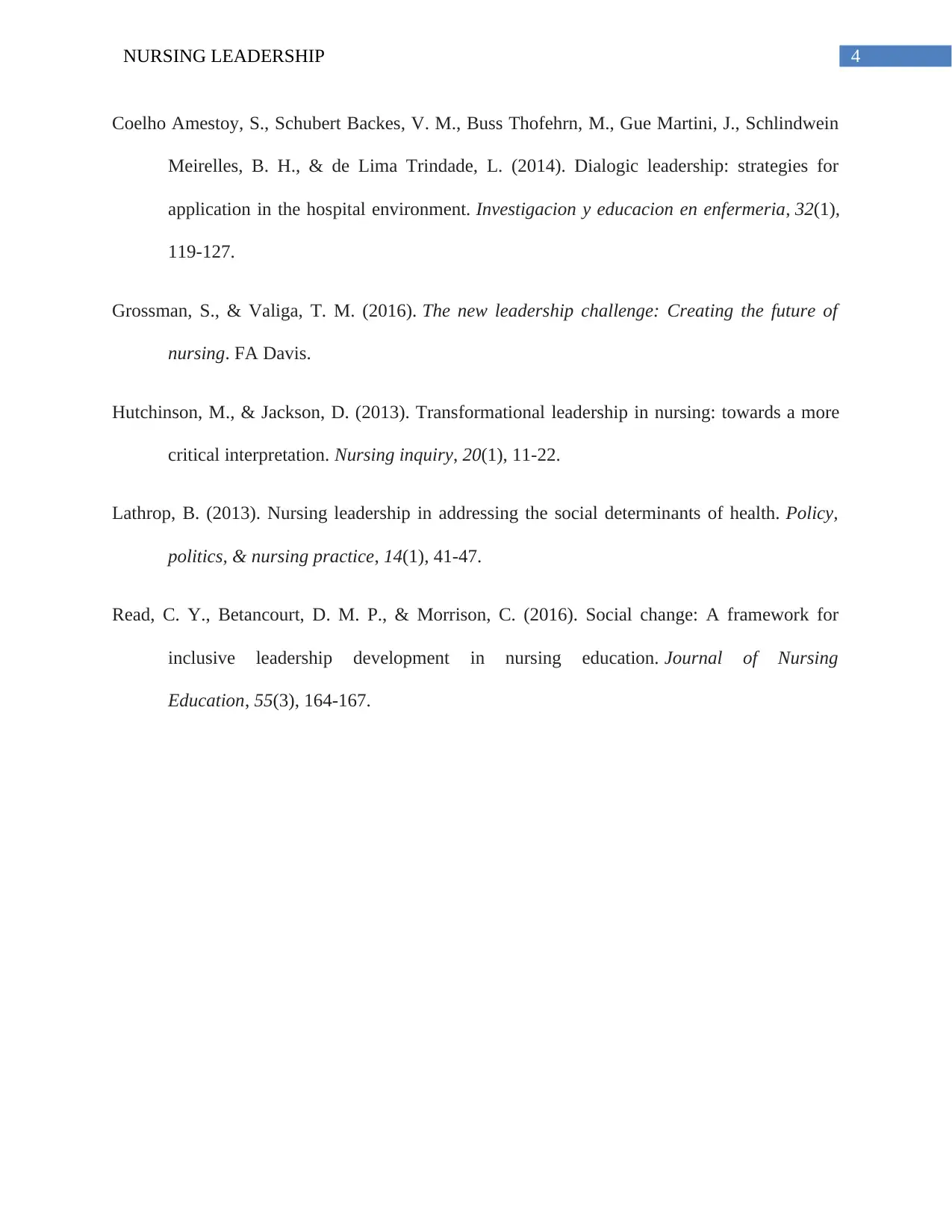
4NURSING LEADERSHIP
Coelho Amestoy, S., Schubert Backes, V. M., Buss Thofehrn, M., Gue Martini, J., Schlindwein
Meirelles, B. H., & de Lima Trindade, L. (2014). Dialogic leadership: strategies for
application in the hospital environment. Investigacion y educacion en enfermeria, 32(1),
119-127.
Grossman, S., & Valiga, T. M. (2016). The new leadership challenge: Creating the future of
nursing. FA Davis.
Hutchinson, M., & Jackson, D. (2013). Transformational leadership in nursing: towards a more
critical interpretation. Nursing inquiry, 20(1), 11-22.
Lathrop, B. (2013). Nursing leadership in addressing the social determinants of health. Policy,
politics, & nursing practice, 14(1), 41-47.
Read, C. Y., Betancourt, D. M. P., & Morrison, C. (2016). Social change: A framework for
inclusive leadership development in nursing education. Journal of Nursing
Education, 55(3), 164-167.
Coelho Amestoy, S., Schubert Backes, V. M., Buss Thofehrn, M., Gue Martini, J., Schlindwein
Meirelles, B. H., & de Lima Trindade, L. (2014). Dialogic leadership: strategies for
application in the hospital environment. Investigacion y educacion en enfermeria, 32(1),
119-127.
Grossman, S., & Valiga, T. M. (2016). The new leadership challenge: Creating the future of
nursing. FA Davis.
Hutchinson, M., & Jackson, D. (2013). Transformational leadership in nursing: towards a more
critical interpretation. Nursing inquiry, 20(1), 11-22.
Lathrop, B. (2013). Nursing leadership in addressing the social determinants of health. Policy,
politics, & nursing practice, 14(1), 41-47.
Read, C. Y., Betancourt, D. M. P., & Morrison, C. (2016). Social change: A framework for
inclusive leadership development in nursing education. Journal of Nursing
Education, 55(3), 164-167.
1 out of 5
Your All-in-One AI-Powered Toolkit for Academic Success.
+13062052269
info@desklib.com
Available 24*7 on WhatsApp / Email
![[object Object]](/_next/static/media/star-bottom.7253800d.svg)
Unlock your academic potential
Copyright © 2020–2025 A2Z Services. All Rights Reserved. Developed and managed by ZUCOL.